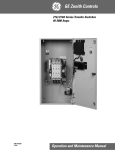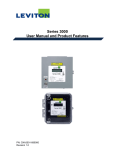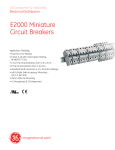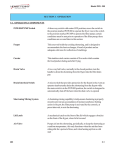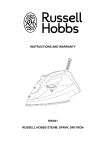Download GE ZTX User's Manual
Transcript
e GE Zenith Controls ZTX Series Automatic Transfer Switches 40-400 Amps 72 R -10 0 0 9/05 Operation and Maintenance Manual Authorized Service For GE parts and service, call: 773 299-6600 Table of Contents Page Introduction . . . . . . . . . . . . . . . . . . . . . . . . . . . . . . .1ii Installation . . . . . . . . . . . . . . . . . . . . . . . . . . . . . . . . .11 Equipment Inspection and Storage . . . . . . . . .11 Final Equipment Inspection . . . . . . . . . . . . . . .11 Mounting . . . . . . . . . . . . . . . . . . . . . . . . . . . . . .11 Power Connections . . . . . . . . . . . . . . . . . . . . . .12 Engine Start Control Connections . . . . . . . . .13 Exerciser Option . . . . . . . . . . . . . . . . . . . . . . . .14 Functional Test . . . . . . . . . . . . . . . . . . . . . . . . .15 Jumper Positions . . . . . . . . . . . . . . . . . . . . . . . . .6 Control Interface . . . . . . . . . . . . . . . . . . . . . . . . . . .17 Indicator LED’s . . . . . . . . . . . . . . . . . . . . . . . . .17 Pushbuttons . . . . . . . . . . . . . . . . . . . . . . . . . . . .17 Using the Keypad Controls . . . . . . . . . . . . . . . .18 Automatic Generator Exerciser . . . . . . . . . . . .19 In-Phase Monitor Operation . . . . . . . . . . . . .110 Page Example Systems . . . . . . . . . . . . . . . . . . . . . . . . . . . .11 Partial Coverage Systems . . . . . . . . . . . . . . . . .11 Total Coverage Systems . . . . . . . . . . . . . . . . . . .11 Typical Diagrams . . . . . . . . . . . . . . . . . . . . . . . . . . . .12 Power Circuit Schematic . . . . . . . . . . . . . . . . . .12 Power Panel Layout . . . . . . . . . . . . . . . . . . . . . .12 Interconnect Plug . . . . . . . . . . . . . . . . . . . . . . .12 Replacement Parts . . . . . . . . . . . . . . . . . . . . . . . . . .13 Standard Transition 40-200 Amps . . . . . . . . . .13 Standard Transition 225-400 Amps . . . . . . . . .14 Troubleshooting . . . . . . . . . . . . . . . . . . . . . . . . . . . .15 Introduction GE Zenith Transfer Switches are used to provide a continuous source of power for lighting and other critical loads by automatically transferring from source 1 power to source 2 power in the event that source 1 voltage falls below preset limits. Voltage sensing and system control is performed via a state-of-the-art microcontroller located on the cabinet door. It is designed to give highly accurate control of the transfer switch system. All GE Zenith transfer switches are designed for use on emergency or standby systems, and are rated for total system or motor loads. Transfer switches are UL Listed under Standard 1008 and CSA Certified under Standard C22.2 No. 178 and IEC Listed under Standard 947. NOTES: A protective device such as a molded case circuit breaker or fused disconnect switch MUST be installed on both sources of incoming power for circuit protection and as a disconnection device. All references made within this manual about the term “S1” or “Source 1” relate to a Normal Power Source. All references made about the term “S2” or “Source 2” relate to an Emergency or Alternative Power Source. Installation DANGER HAZARDOUS VOLTAGE (Can Cause Severe Injury or Death) Turn OFF all power before installation, adjustment, or removal of transfer switch or any of its components. The safe operation of your switch is GE Zenith’s focus. The proper storage, installation, operation and maintenance will help increase the life of the switch. CAUTION Due to hazardous voltage and current, GE Zenith recommends that a GE Zenith Certified technician or a qualified electrician must perform the installation and maintenance of the switch. 2. 3. 4. Verify that all cabled connections are correct. Check engine start connections and verify the correct connection of all control wires. Check the lug torque values of the power connections. NOTE: 5. Make sure that all covers and barriers are installed and properly fastened. NOTE: Equipment Inspection and Storage Once you have received the transfer switch, inspect it for any damage. This includes damage to the enclosure, power panel, control panel and wiring harness. If any damage is found or suspected, file a claim as soon as possible with the carrier and notify the nearest GE Zenith representative. Before installation, it is necessary to store the transfer switch in a clean dry place, protected from dirt and water. Provide ample air circulation and heat, if necessary, to prevent condensation. Storage Temperature -30°C to +75°C (-22°F to +167°F) Operating Temperature (Ambient): -20°C to +65°C (-4°F to +149°F) Humidity 5% to 95% (non-condensing) Prior to energizing the transfer switch: 1. Remove any debris incurred, with a vacuum, due to shipment or installation. WARNING Do not use a blower since debris may become lodged in the electrical and mechanical components and cause damage. ■ GE Zenith Controls Power panels ship from GE Zenith in the Normal Position. Each GE Zenith transfer switch is factory wired and tested. A complete information package is furnished with each switch which includes: a. Sequence of operation. b. Description and operation of all accessories supplied. c. Power panel connection diagram and schematic. d. Description and identification of all customer field connections. Installation of GE Zenith transfer switches includes: a. Mounting the transfer switch cabinet. b. Connection of all Normal, Emergency, and Load cables or bus bars. c. Connection of external control circuits as required. Mounting Enough room should be allowed to open the cabinet doors fully for inspection and servicing of the switch per NEC and local codes. NOTE: Final Equipment Inspection Lug torque values are specified in the power panel manual. When lifting the switch using a spreader bar, height H must be equal to half of distance D. CAUTION Before drilling conduit entry holes or any accessory mounting holes, cover and protect the switch and control panel to prevent dirt and metal fragments from entering the mechanical and electrical components. Failure to do so may result in damage and malfunction of the switch. ZTX Operation and Maintenance Manual (72R-1000) 1■ Installation (cont’d) DANGER HAZARDOUS VOLTAGE (Can Cause Severe Injury or Death) Turn OFF all power before installation, adjustment, or removal of transfer switch or any of its components. Connect the Normal, Emergency, and Load conductors to the clearly marked terminals on the transfer switch. Remove surface oxides from cables by cleaning with a wire brush. Verify that all connections are correct before tightening the lugs. All cable lug connections must be tightened to the proper torque values as shown in Table 2. Power Connections GE Zenith transfer switches are supplied with UL listed solderless screw type terminals as standard for the Normal, Emergency and Load power connections. Table 1 lists the number and sizes of cable lugs supplied as standard for each switch amp rating. NOTE: Do not run cables or wiring behind front-connected transfer switches. Screw Type Terminals for External Power Connections Switch Size (Amps) Fully Rated Neutral Bar (When Required) Utility, Generator and Load Terminals Cable Per Pole Range of Wire Sizes No. of Cables Range of Wire Sizes 40 1 #8 to 3/0 AWG 3 #8 to 1/0 AWG 80 1 #8 to 3/0 AWG 3 #8 to 1/0 AWG 100 1 #8 to 3/0 AWG 3 #8 to 1/0 AWG 150 1 #8 to 3/0 AWG 3 #8 AWG to 300 MCM 200, 225, 250* 1 #6 AWG to 250 MCM 3 #6 AWG to 300 MCM 300, 400 1 #4 AWG to 600 MCM 3 #4 AWG to 300 MCM Table 1 LOAD TERMINALS * IEC Rating Only UTILITY TERMINALS T1 T2 T3 Tip! OPTIONAL TION A4 CONTACT N1 N2 N3 BR OPERATES ERAT WHEN IN UTILITY ILITY POSITION Install load cables first. JP SWITCH POSITION INDICATOR N E1 E2 E3 OPTIONAL TION A3 CONTACT GENERATOR TERMINALS T = Load N = Utility OPERATES ERAT WHEN IN GENERATOR NERA POSITION E = Generator Figure 1 - Power Panel ■2 ZTX Operation and Maintenance Manual (72R-1000) GE Zenith Controls ■ Installation (cont’d) DANGER HAZARDOUS VOLTAGE (Can Cause Severe Injury or Death) Turn OFF all power before installation, adjustment, or removal of transfer switch or any of its components. Control Connections Note: N = Utility Position E = Generator Position Connecting Engine Start may cause Generator to start. Before connecting, turn Generator OFF. With the Generator breaker open and the Generator control switch off, install the Generator start connections. Figure 4 JP Manual operation is possible for maintenance purposes only. Manual operation of the switch can be checked before it is operated electrically. Battery Connection With all power off, insert a Phillips screwdriver or equivalent size tool into the manual operator socket and operate the transfer switch between the Utility and Generator positions. The transfer switch should operate smoothly without binding. Return the switch to the Utility position, remove the screwdriver. Figure 2 The engine-start terminals are clearly identified by a label on the microcontroller backplate. In the case of manual transfer switches, or in other applications not requiring the microprocessor, clearly marked terminal blocks are provided in the upper left corner of the control panel for the engine start control wires. Terminals for field connections to the A3 Emergency auxiliary contacts and the A4 Normal auxiliary contacts are also provided. These terminals are clearly marked and appear on the side of the power panel. On 400 amp metal frame units these terminals appear on the bracket above the operator handle. g GE Zenith Controls VOLTS AMPS - SYSTEM VOLTS: Socket Size Across Flats Torque Lb. - In. Lb. - Ft. 1/8 45 4 5/32 100 8 3/16 120 10 7/32 150 12 1/4 200 17 5/16 275 23 3/8 375 31 1/2 500 42 9/16 600 50 Table 2 SERIAL NUMBER: RATING: Tightening Torque for Lugs HZ PHASE - MODEL NUMBER: Figure 3 ■ GE Zenith Controls ZTX Operation and Maintenance Manual (72R-1000) 3■ Installation (cont’d) DANGER HAZARDOUS VOLTAGE (Can Cause Severe Injury or Death) Turn OFF all power before installation, adjustment, or removal of transfer switch or any of its components. ATTENTION! This applies only to the switches with the RM4-CAT exerciser option: Only after ATS installation, connect a commercial-grade alkaline 9V battery to the MX60 controller via the harness connected to the controller. The battery should be placed in the holder installed just above the controller. The battery is used to maintain the exerciser function in the event of power outage. The battery should be replaced at least once a year. If the battery is not installed and/or replaced as recommended, an exerciser set from the front panel will lose its settings during power outages and the exerciser will not work. Note: Battery life if reduced if neither source is available. Typical battery life when both sources are unavailable is 21 days. Should the battery connection become disconnected in shipping, take the controller cover off and plug the harness into the receptacle in the top right corner of the MX controller as shown in figure 2 and 5. Reinstall the cover and connect the battery. Battery and Holder Battery Harness MX60 Controller (Under Cover) Figure 5 ■4 ZTX Operation and Maintenance Manual (72R-1000) GE Zenith Controls ■ Installation (cont’d) DANGER HAZARDOUS VOLTAGE (Can Cause Severe Injury or Death) Turn OFF all power before installation, adjustment, or removal of transfer switch or any of its components. Functional Test Functional testing of the automatic transfer switch (ATS) is described in this section. Before proceeding, read and understand all instructions and review the operation of all accessories provided. To begin the test, close the Utility source circuit breaker. Referring to Figure 7, the controller will illuminate the Utility Available LED when proper voltage is sensed. If the ATS mechanism is set on S1, the S1 position LED will also light.. Verify the phase to phase voltages at the Utility line terminals. Next, close the Generator source breaker and start the engine generator. The S2 (Generator) Available LED will illuminate when proper voltage and frequency levels are sensed. After both sources have been verified, shut down the engine generator, and put the generator’s start control in the automatic position. Complete the visual inspection of the transfer switch, and replace the cabinet cover (or close the cabinet door). Simulate a utility outage by opening the S1 Utility side breaker. The delay to engine start timer (P) begins its timing cycle. After the P timer has completed its timing cycle, the engine start contacts close to start the generator. When generator voltage and frequency reach the preset restore points (see Table 4) the S2 Available LED illuminates. Simultaneously, the delay to generator timer (W) begins its timing cycle. When the W time delay is completed the ATS will transfer to Generator, the S1 position LED goes off, and the S2 position LED illuminates. Reclose the Utility breaker to retransfer to utility. The delay to utility timer (T) begins its timing cycle (Table 3). When the T timer has completed its timing cycle, the ATS will transfer. The optional S2 position LEDs go off, and the S1 position LED illuminates. The delay engine stop timer (U) begins its timing cycle. The generator runs unloaded for the duration of the U timing cycle. When the timer completes its timing cycle, the generator will stop. The S2 Available LED goes off. ATS Timing Cycle Action P Timer P - 5 sec. W Timer W - 20 sec. T Timer T - 5 min. U Timer U - 5 min. S1 Fail or Test or Exerciser Time Delay S2 Start Time Delay S2 Stable Time Delay S1 Stable Time Delay S2 Stop Retransfer to S1 Engine Cool-Down Transfer to S2 S1 returns or Test/Exerciser Ends Table 3 Preset Settings Utility Generator S1 Fail Voltage 80% Nominal Line Voltage S2 Fail Voltage S1 Restore 90% Nominal Line Voltage S2 Restore Voltage S1 Fail Frequency 80% S2 Fail Frequency S1 Restore Frequency 90% S2 Restore Frequency Timers P Timer P - 5 sec. W Timer W - 20 sec. 80% Nominal Line Voltage 90% Nominal Line Voltage 90% 95% T Timer T - 5 min. U Timer U - 5 min. Table 4 ■ GE Zenith Controls ZTX Operation and Maintenance Manual (72R-1000) 5■ Installation (cont’d) DANGER HAZARDOUS VOLTAGE (Can Cause Severe Injury or Death) Turn OFF all power before installation, adjustment, or removal of transfer switch or any of its components. System Voltage Settings Voltage / Frequency Selection Jumper Settings ZTX controller boards are preconfigured to the system voltages specified at the time of order. Exact system voltages are normally set at the factory, however, depending on the actual application and system nominal voltage, ZTX control boards are capable of being adjusted slightly, to meet different source characteristics for voltage as well as frequency. (See Table 5) Figure 6 (on right) shows the variations each of the 3 basic types of controllers can be adjusted to within its nominal voltage range. Position Jumpers JP1 and JP2, as needed for voltage. Position JP3 for frequency. As with any other Jumper setting, always remove power completely from the controller before making changes. 240/480 120/380 JP1 JP1 JP2 JP2 A B 208/416 JP1 JP1 JP2 JP2 A Type 2 120V JP1 JP2 B B - 208 - 240VAC JP1 JP2 208 A B 220 B A 240 A A B 220/440 B 50Hz A B A B 60Hz JP3 JP3 A B Note: Do not change voltage Jumper positions without consulting service or technical support. Arbitrarily changing voltage jumpers can adversely affect ATS operation. Type 1 A Figure 6 Type 3 380 - 416VAC JP1 JP2 380 B B 416 A B - Type 4 440 - 480VAC JP1 JP2 440 B A 480 A A - Frequency 50 Hz 60 Hz - JP3 A B Table 5 ■6 ZTX Operation and Maintenance Manual (72R-1000) GE Zenith Controls ■ Control Interface DANGER HAZARDOUS VOLTAGE (Can Cause Severe Injury or Death) Turn OFF all power before installation, adjustment, or removal of transfer switch or any of its components. Indicator LEDs A S1 (Utility) Available Green LED. When on, indicates source is acceptable. B S1 (Utility) Position Green LED. When on, indicates ATS is connected to Utility C S2 (Generator) Available Red LED. When on, indicates source is acceptable. D S2 (Generator) Position Red LED. When on, indicates ATS is connected to Generator. E Timing/In-phase Amber LED. When blinking, indicates the ATS is timing a Delay When on steady, indicates the ATS is waiting for both sources to synchronize with each other. C D E A B Figure 7 F G ■ GE Zenith Controls H I Pushbuttons F TEST - Pressed and held for 1 second Simulates a power outage, starts the Generator and transfers the ATS to S2. G EXER SET - Sets an Automatic Exerciser H BYPASS TIMER - Pressed while E is blinking bypasses any remaining countdown Timer I CANCEL - Depending on the current state of ATS operation, ends specific functions or indications ZTX Operation and Maintenance Manual (72R-1000) 7■ Control Interface (cont’d) DANGER HAZARDOUS VOLTAGE (Can Cause Severe Injury or Death) Turn OFF all power before installation, adjustment, or removal of transfer switch or any of its components. Using the Keypad Controls TEST KEY TIMER BYPASS The TEST KEY initiates a transfer sequence to S2 and holds the ATS in that mode until either the CANCEL key is pressed or, a situation arises to cause the ATS to go back to S1(ie, S2 actually fails). This key is used to bypass (truncate), any of the running timers shown in Table 3. Whenever the Timing/ Inphase LED is blinking, pressing the TIMER BYPASS will end that particular delay and cause the ATS controller to immediately jump to the next sequence step. In order to perform a TEST, the ATS must be on S1 and S1 must qualify as a "good source" by being above the FAIL thresholds for both Voltage and Frequency (see Table 2). Once the TEST KEY is pressed for at least 1 Sec, the ATS will begin the Timer Sequence (see figure 5), attempt to start S2 generator source, and if S2 qualifies as a "good source", transfer the load to S2. (There is no P-Time in a test) The TEST key is typically used to perform a system operational or maintenance test or, to purposely cause and hold the Load off of S1. If during the TEST, S2 fails and S1 is available, the TEST will be cancelled and the Load will be immediately retransferred to S1. EXER SET Whenever it is required to have a regular test performed automatically on a repeating basis, the Automatic Exerciser function can be setup using this key. Note: The BYPASS key cannot be used to truncate an In-phase transfer sequence, or the P-Timer. CANCEL The CANCEL key performs 3 different cancel actions depending on the ATS current state of operation: 1. If the ATS is currently performing a TEST, the CANCEL key will cancel the test. 2. If an Automatic Exerciser has been set, pressing and holding the CANCEL key for 10 Sec. will cancel (and remove), the set exercise 3. If after in-phase monitor has passed 1 minute, waiting for sources to synchronize, will cause transfer immediatly (which may result in an out-of-phase transfer). Depending on the jumper settings shown in Figure 8, the ATS can be programmed to perform a repeating 7, 14, 21 or 28 day exercise at a particular time of day. To initiate an Automatic Exercise, the EXER SET key is pressed and held for at least 1 Sec. at the desired exercise time. The ATS will begin the Timer Sequence, attempt to start S2 generator source and if S2 qualifies as a good source, transfer the Load to S2 for the duration of the Generator Run-Time. After the Generator Run-time has expired, the timing sequence will restart and the Load will be transferred back to S1, after Ttime, ending by running the U-time and finally ending the call for S2. ■8 ZTX Operation and Maintenance Manual (72R-1000) GE Zenith Controls ■ Control Interface (cont’d) DANGER HAZARDOUS VOLTAGE (Can Cause Severe Injury or Death) Turn OFF all power before installation, adjustment, or removal of transfer switch or any of its components. Automatic Generator Exerciser The ZTX automatic generator Exerciser can perform a pre-scheduled repeating test of the generator and/or the ATS mechanism depending on which jumpers are selected on the controller board. Additionally, the ATS can be preset to perform the exercise every 7, 14, 21 or 28 days. Regardless of which interval is selected, all exercisers have a preset run-duration of 10 minutes. Selection of the exerciser interval is through three jumpers located on the controller board as shown in Figure 6. The Exerciser comes from the factory preset at 28 days and is not active. To change the exerciser interval, remove power from the controller completely, and move the jumpers at positions jp4 and jp5 to match the selected repeat-cycle from the configurations shown in Figure 7. Selecting Exerciser with or without Load Transfer The Exerciser function can be programmed to perform either a Load-transfer or a non-Load transfer. Selecting either is done by changing the Jumper JP6 as shown in Figure 8. To change between a Load-transfer or no-Load transfer, remove power from the controller completely and move the jumper at position JP6. Note: pressing the CANCEL key in the middle of an scheduled event does not cancel a set Exerciser, but only cancels the current event. To completely clear an already-set Exerciser A set Exerciser can be completely cleared out of memory by pressing and holding the CANCEL key for at least 10 Seconds causing the blink indication to stop. If S2 fails to meet the criteria for a good source, during an Exercise attempt, the Controller will continue to hold the P-contacts closed for the duration of the Runtime timer then wait for the next scheduled exercise. If S2 fails during an Exercise, the Controller will abort that exercise and wait till then next scheduled exercise. Automatic Exerciser Jumper Settings Setting and Canceling an Exerciser In order to set an automatic Exerciser, choose the exerciser interval and whether a Load-transfer or no-Load transfer is desired as stated above. An exercise can only be set if S1 is available and the ATS (and Load), is on S1 source. 7 Day 14 Day JP4 JP4 JP5 JP5 A B A JP4 At the exact time desired, press and hold the EXER SET key for at least 1 second. The ATS will immediately start an initial exercise by attempting to start the generator, running through the Timers (figure 3) and will either only start the generator, or, will start the generator and transfer the Load from S1 to S2, for the time duration of the exerciser interval, 10 minutes. Once the Exercise is completed, the ATS will continue the timing sequence and retransfer the Load back to S1, cool down the generator and terminate until the next scheduled interval time. Any time an Exerciser has been established and is scheduled, the S2 Available and S2 position LEDs quickly blink approximately every 4 seconds as a reminder. However, if S2 source becomes available during the time B 28 Day 21 Day To establish an Exerciser ■ GE Zenith Controls the ATS is waiting for the next impending exercise, the ATS will not show a blinking indication but instead will show the S2 Available LED as solidly on to indicate the true condition of S2. Any Exercise event can be prematurely canceled by pressing the CANCEL key. JP4 JP5 JP5 A B A JP6 B No Load JP6 Load A B Figure 8 ZTX Operation and Maintenance Manual (72R-1000) 9■ Control Interface (cont’d) DANGER HAZARDOUS VOLTAGE (Can Cause Severe Injury or Death) Turn OFF all power before installation, adjustment, or removal of transfer switch or any of its components. In-Phase Monitor ZTX ATS senses when the sources are as far out as 2 Hz or as close as .01Hz in frequency differential of each other and transfers the load to and from either source in-phase. If turned on, R50 In-Phase monitor tracks the frequency of both the Utility and Generator sources allowing a smooth, synchronous transfer of the load, which is especially beneficial where conveyors, pumps and other motor loads are involved. ZTX indicates it is waiting for the sources to synchronize by holding the Timer/In-Phase LED on. When both sources have synchronized, the ATS will transfer the Load (within 20° of each other, if sources are within 2Hz differential), and the Timer/In-Phase LED will turn off. If the sources fail to synchronize, after 1 minute, the controller will blink the Timer/In-Phase LED once, alerting the operator that the In-Phase monitor function can be bypassed by pressing the CANCEL key, causing an immediate transfer (see Cancel Key function). If the CANCEL key is not pressed, the ZTX will continue to wait for an inPhase condition to occur. In the case of both sources coming from the same source, or, one configured as WYE and the other as DELTA, the frequency difference is fixed at the same frequency or fixed but 30 degrees out of phase. In those cases, In-Phase Monitor can be turned off. In-Phase Monitor is turned on as default from the factory. To turn In-Phase Monitor OFF or ON, take the following steps: In a typical ATS application, one source is on the utility and one source is a backup system such as a gas or diesel generator. Because sources have a slight frequency difference, sources come in and out of phase. If ZTX In-Phase Monitor is on, The ZTX ATS Controller monitors both sources and transfers the Load at the ideal time to minimize back-EMF conditions. Turn In-Phase Monitor OFF: 1. Remove all power, (both S1 and S2) from the controller. Wait at least 20 seconds. 2. From the keypad, hold both the BYPASS and CANCEL keys down while energizing either source. If In-Phase Monitor was on, the Timer / In-phase LED will flash once for 1 second, then go out. The In-Phase Monitor is now off. Turn In-Phase Monitor ON: 1. Remove all power, (both S1 and S2) from the controller. Wait at least 20 seconds. 2. From the keypad, hold both the BYPASS and CANCEL keys down while energizing either source. If In-Phase Monitor was off, the Timer/In-Phase LED will light and remain lit until the keys are released. The In-Phase Monitor is now on. Timer / In-phase LED Figure 9 ■ 10 ZTX Operation and Maintenance Manual (72R-1000) GE Zenith Controls ■ Example Systems Partial Coverage System Loads Figure 9 Transfer Switch Utility Source Circuit Breaker Generator Source Utility Panel Loads Distribution Panel Total Coverage System Figure 10 Transfer Switch Utility Source Circuit Breaker Circuit Breaker Generator Source Main Breaker Panel All Loads ■ GE Zenith Controls ZTX Operation and Maintenance Manual (72R-1000) 11 ■ Typical Diagrams Power Circuit Schematic 40-240 Amps Figure 11 Power Panel Layout Interconnect Plug 5 1 CCN SN SCOM SE E2 N1 N2 CCE E1 10 6 OPTIONAL 3 4 2 Figure 12 ■ 12 ZTX Operation and Maintenance Manual (72R-1000) N2 E3 N3 E2 3 1 Figure 13 GE Zenith Controls ■ Replacement Parts Standard Transition — 40 to 200 Amps BR SN A4 CN/CE SP+L SE A3 SCN/SCE Figure 14 TAG CN/CE DESCRIPTION Solenoid Solenoid Plunger and Link VOLTAGE 120 208 220 240 380/416 440/480 ALL 40 TO 200 AMPS K-2207 K-2208 K-2208 K-2228 K-2212 K-2209 57P-1030 SCN/SCE Coil Cutout Switch 120-480V L-3078 SCN/SCE Coil Cutout Switch 600V L-4027 Rectifier ALL PS-5076 BR A3/A4 Auxiliary Contacts L-3078 Table 7 ■ GE Zenith Controls ZTX Operation and Maintenance Manual (72R-1000) 13 ■ Replacement Parts (cont’d) Standard Transition - 225 to 400 Amps BR T1 T2 T3 TN N1 N2 N3 NN CN/CE SN A4 SE A3 E1 E2 E3 EN Figure 15 Tag N 1,2,3 N E 1,2,3 N T 1,2,3 N Recommended as Spares Description Cable Connection Lug Wire Size Stock Numbers by Amperage 225, 250* 260, 300* 400 S-2701 S-2701 S-2701 #6-250 MCM #4-600 MCM #4-600 MCM Coil Volts CN/CE Solenoid SN/SE Position Sense Limit Switch A3/A4 Auxiliary Contacts BR Rectifier * 208/220/240 K-2246B L-3078 * PS-5076 Table 8 ■ 14 ZTX Operation and Maintenance Manual (72R-1000) GE Zenith Controls ■ Troubleshooting DANGER HAZARDOUS VOLTAGE (Can Cause Severe Injury or Death) Turn OFF all power before installation, adjustment, or removal of transfer switch or any of its components. Service must be performed by qualified personnel. Symptom Possible Cause Corrective Action S1 or S2 Available LED not lit Sources either fully or partially unacceptable S1 or S2 breakers open Check for under voltage Check for missing phase (s) Check for under frequency ATS will not retransfer Load back to Utility T - Timer has not expired Automatic Exerciser is in process S1 Utility fully or partially unacceptable ATS does not transfer Load to S2 (generator) S2 Generator fully or partially unacceptable Motor loads on system creating enough backEMF to keep missing phase from falling below Fail setpoint. Set motor-saver to dropout below ATS Fail setpoint S2 Generator will not start X1 or X2 not connected Check Generator Start wiring S2 Generator will not shut down U - Timer not expired Automatic Exerciser in process Wait for U timer to expire All LEDs off Keypad connector unplugged at Controller Both source breakers open ATS will not transfer in-phase In-Phase monitor not on Frequency difference between S1 and S2 greater than 2Hz. Turn on In-Phase monitor Adjust Generator governor to hold freqency closer to Utility ATS will not retain a Set Automatic Exerciser Battery dead or missing Replace battery with a fresh industrial grade Alkaline battery Timer/In-Phase LED constantly on Both sources locked in frequency or one source greater than 20° out of phase Turn In-Phase monitor off S1 and S2 LEDs Blinking Phase Rotation Mis-match between sources Rewire sources to be same rotation S1 Position LED Blinking SN limit switch bad or intermittent Check connection or SN limit switch S2 Position LED Blinking SE Limit switch bad or intermittent Check connection or SE limit switch Both S1 and S2 Positioin LEDs Blinking Solenoid bad or disconnected ATS contactor in mid-position Requires CANCEL key to clear check Solenoid Requires CANCEL key to clear Check both limit switches Table 9 ■ GE Zenith Controls ZTX Operation and Maintenance Manual (72R-1000) 15 ■ g GE Zenith Controls A Product of GE Consumer & Industrial General Electric Company 830 West 40 th Street, Chicago, IL 60609 USA 773 299-6600, Fax: 773 247-7805 www.geelectrical.com



















